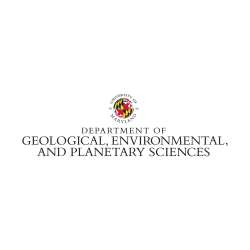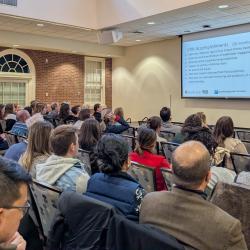UMD Named a Host Institution for Prestigious Planetary Science Postdoctoral Fellowship
Through the Heising-Simons Foundation’s 51 Pegasi b Fellowship, postdoctoral researchers will have the chance to probe the mysteries of the universe at the University of Maryland
The University of Maryland has been named one of 18 institutions in the United States that can host early-career planetary scientists through the competitive 51 Pegasi b Fellowship program. Funded and sponsored by the California-based Heising-Simons Foundation, the three-year program (which now includes an option to apply for a fourth year) enables postdoctoral researchers to conduct theoretical, observational or experimental studies with the support of university faculty members in their field of interest.
"We are eager to begin hosting and training 51 Pegasi b postdoctoral fellows at the University of Maryland, where they will benefit from our interdisciplinary approach to planetary astronomy,” said Amitabh Varshney, dean of UMD’s College of Computer, Mathematical, and Natural Sciences.
Fellows placed at UMD will have access to a network of faculty in the Astronomy, Geology, and Atmospheric and Oceanic Science departments.
“We are excited for our future 51 Pegasi b fellows to have the opportunity to be hosted at the University of Maryland,” said Emily Schaller, Heising-Simons Foundation’s science program officer. “UMD has many scientists across multiple departments conducting cutting-edge planetary science and astronomy research. We feel our fellows will have a great opportunity to excel in this environment scientifically and will be well-supported in their professional growth.”
Established in 2017, the fellowship is named after 51 Pegasi b, the first exoplanet found orbiting a sun-like star. This groundbreaking discovery in 1995 challenged existing theories of planet formation and opened the door to an entirely new discipline: exoplanetary exploration. Since then, more than 5,000 exoplanets—bodies that orbit a star outside of our solar system—have been charted across the Milky Way.
UMD Astronomy Professor Derek Richardson was involved in some of the earliest studies to explain the formation and orbital migration of 51 Pegasi b. UMD also has two astronomy faculty members—Associate Professor Eliza Kempton and Assistant Professor Thaddeus Komacek—who specialize in exoplanet atmospheres. Kempton said these factors put UMD in a unique position to host fellows who are interested in this growing field of research.
“UMD’s Astronomy Department has a deep strength in exoplanet atmospheres,” Kempton said. “I think we have a good chance of attracting fellows who are interested in the theory and modeling of exoplanet atmospheres in particular.”
Prospective fellows will not be limited to exoplanet research, though. Komacek, a former 51 Pegasi b fellow who completed his program at the University of Chicago in 2021, said fellows can pursue any research topic of relevance to planetary astronomy. This could include cross-cutting subjects such as planetary geophysics, geochemistry or cosmochemistry.
“The goal is to have a breadth of expertise—between our Astronomy Department, our Geology Department, and our Department of Atmospheric and Oceanic Science—that supports excellent scholars, whatever science interests they want to focus on,” Komacek said. “Our goal is to recruit the best scientists that we can.”
Komacek and Kempton will both play an active role in recruiting prospective fellows and referring them to the Heising-Simons Foundation for further consideration. The foundation expects to choose six to eight fellows for the upcoming cycle, which begins in fall 2023. Applications are due by October 10, 2022.
Fellows are selected based on the significance and innovativeness of their research topic, their research strategy, their education and training qualifications, and their commitment to the advancement of diversity, equity and inclusion in the field.
Fellows will receive a three-year grant of up to $415,000, which covers salary, benefits, equipment and other discretionary costs, such as family care, travel and moving expenses. Assuming satisfactory progress at the conclusion of three years, fellows will have the option to apply for a fourth year of funding to support them as a postdoc or as a new faculty member. The program is open to national and international applicants who hold (or will hold, by the start of their fellowship) a doctoral degree in astronomy, physics, earth and planetary sciences, chemistry, mathematics, engineering or a related discipline.
###
Media Relations Contact: Emily C. Nunez, 301-405-9463, ecnunez@umd.edu
University of Maryland
College of Computer, Mathematical, and Natural Sciences
2300 Symons Hall
College Park, MD 20742
www.cmns.umd.edu
@UMDscience
About the College of Computer, Mathematical, and Natural Sciences
The College of Computer, Mathematical, and Natural Sciences at the University of Maryland educates more than 9,000 future scientific leaders in its undergraduate and graduate programs each year. The college's 10 departments and more than a dozen interdisciplinary research centers foster scientific discovery with annual sponsored research funding exceeding $200 million.








